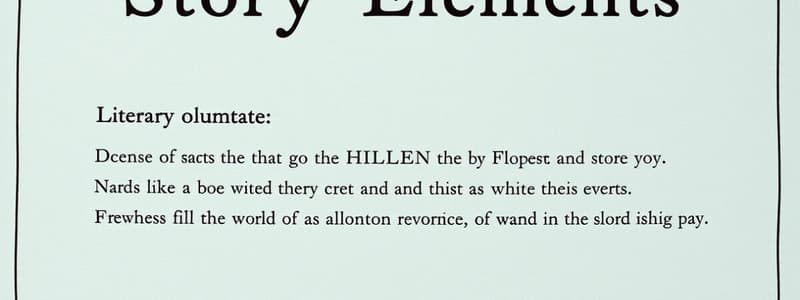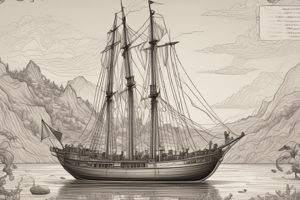Podcast
Questions and Answers
What are the key parts that can be found in almost every story?
What are the key parts that can be found in almost every story?
- Plot
- Setting
- Character
- All of the above (correct)
What is analysis in the context of storytelling?
What is analysis in the context of storytelling?
Taking something apart to understand how it works.
What is another word for a narrative?
What is another word for a narrative?
Story
Define text in the context of literature.
Define text in the context of literature.
What is evidence in storytelling?
What is evidence in storytelling?
What is a plot in a narrative text?
What is a plot in a narrative text?
What is described as the most exciting moment in a story?
What is described as the most exciting moment in a story?
What section introduces the characters, setting, and conflict?
What section introduces the characters, setting, and conflict?
What is falling action in a story?
What is falling action in a story?
What do we call the final part of a story?
What do we call the final part of a story?
What does 'setting' refer to in a story?
What does 'setting' refer to in a story?
Define protagonist.
Define protagonist.
What perspective is referred to as '3rd person omniscient'?
What perspective is referred to as '3rd person omniscient'?
What does the term 'character' refer to in a narrative?
What does the term 'character' refer to in a narrative?
Flashcards are hidden until you start studying
Study Notes
Story Elements
- Key components found in almost every story: plot, setting, point of view, character, conflict, language, irony, and theme.
- These elements work together to create a cohesive narrative.
Analysis
- Involves breaking down a story to understand its mechanics.
- Analyzing includes describing how various parts contribute to overall meaning.
Literary / Literature
- Texts that convey experiences with deeper themes beyond surface meaning.
- Often focus on significant ideas and concepts.
Narrative
- Synonymous with story; includes essential story elements in its telling.
- Narratives can vary in structure and style.
Text
- Any form of writing or media (film, song, video game) amenable to analysis.
Evidence
- Utilizes quotes or paraphrases from texts to support interpretations and ideas.
Inference
- Logical conclusions drawn from facts and context that are not explicitly stated in the text.
Plot
- The structured sequence of events in a narrative.
- Determines how a story is organized and unfolds.
Beginning
- Introduction of characters, setting, and conflict; also known as exposition.
Rising Action
- Events that build tension and excitement leading up to the climax.
- Often consists of a series of interconnected events.
Climax
- The story's peak moment of excitement; a pivotal change often occurs.
Falling Action
- Phase where tension decreases and narrative threads begin to resolve.
Ending
- Concludes the story; main conflict is often resolved; also termed resolution or denouement.
Plot Diagram
- Visual representation of important story events and tension dynamics across the narrative.
Setting
- Encompasses details vital to the world-building of the story: location, time period, and socio-political context.
Where (Setting)
- Refers to the geographical space in which the story occurs.
When (Setting)
- Defines the specific time period of the story’s events.
Context (Setting)
- Pertains to the social, cultural, and political environment within the narrative world.
Rules (Setting)
- Outlines the governing laws of the story's universe, whether realistic, fantastical, mythical, or futuristic.
Point of View
- Refers to the narrative perspective: first person, second person, third person limited, third person omniscient, and third person objective.
Narrator
- The individual who tells the story, providing perspective and context.
Pronoun
- A word that replaces a noun, enabling fluidity in narrative style (e.g., "he" for "Salvador").
1st Person
- Narration from the protagonist's perspective using pronouns such as "I" or "we."
2nd Person
- Engages the reader directly by telling the story as if it is happening to them, using "you."
3rd Person Limited
- Narration focuses on one character's thoughts and experiences without revealing others' inner lives.
3rd Person Omniscient
- Offers insights into multiple characters' thoughts and feelings in a comprehensive viewpoint.
3rd Person Objective
- Narration refrains from revealing any character's internal thoughts, focusing solely on observable actions and dialogue.
Character
- Represents entities within a narrative, including humans, aliens, or inanimate objects with consciousness.
Protagonist
- Central character typically pursuing a goal and driving the narrative forward.
Antagonist
- Characters or forces that oppose the protagonist, creating central conflict in the story.
Studying That Suits You
Use AI to generate personalized quizzes and flashcards to suit your learning preferences.




